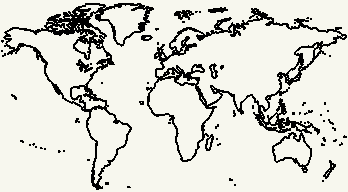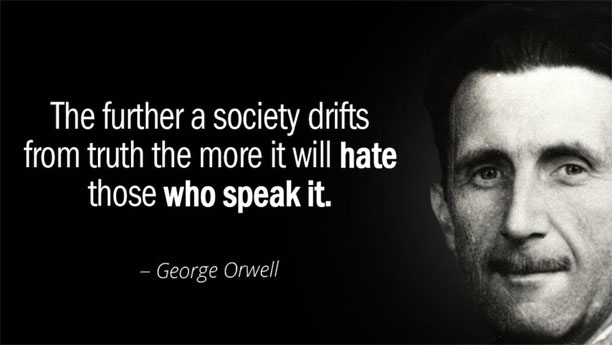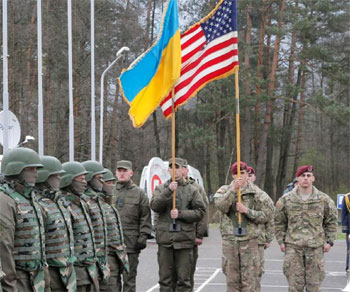Pages: << 1 ... 36 37 38 39 40 41 42 43 44 45 46 ... 1278 >>
Everything You Need to Know about the Conflict in Ukraine
by Paul Craig Roberts
The Soviet Union collapsed when Soviet President Gorbachev was placed under house arrest by hardline elements in the Politburo who were alarmed by the rapidity with which Gorbachev was establishing friendly and open relations with the West.
For the hardline American neoconservatives, the Soviet Collapse removed the constraint on American unilateralism. The neoconservatives quickly seized the initiative and with the Wolfowitz Doctrine declared US hegemony and stated that the principal goal of US foreign policy was to prevent the rise of any power that could serve as a constraint on Washington’s hegemony. This policy resulted in the hopes of Reagan and Gorbachev and the trust Gorbachev had placed in Washington being frustrated. Washington’s pledge not to move NATO one inch to the East was disavowed, and more hostile steps followed.
By 2007 it was clear to Russia’s President Putin that the promise of a multi-polar world was being over-ridden by a policy of Washington’s hegemony. At the Munich Security Conference, Putin threw down the gauntlet and said that Russia did not accept Washington’s rules based uni-polar world. At that moment the US/NATO went to war against Russia.
The first attack on Russia was a year later in 2008 when Washington sent a US supplied and trained Georgian army into disputed South Ossetia, resulting in the deaths of Russian peace-keepers and many civilians. Putin, caught off guard, returned from the Beijing Olympics, and the Russian army quickly defeated the US trained Georgian forces. Putin is often accused of intending to rebuild the Soviet Empire, but he had in his hands Georgia, historically a part of the Soviet Union and previously of Russia. Instead of reincorporating Georgia back into Russia, he turned them loose to be again subjected to Washington’s plots against Russia.
Please Stop Saying That Every War Is Not a War But Something Bad
David Swanson, World BEYOND War
Yes, I’m going to say this again. I’ve heard not the slightest hint of a refutation or objection to it, and yet so many, many people ignore it.
For the love of all that is decent, immediately stop the self-defeating idiocy of calling every goddamned war “not a war.”
Please. With all due respect.
“It’s not a war. It’s terrorism.” “It’s not a war. It’s genocide.” “It’s not a war. It’s an occupation.” “It’s not a war. It’s ethnic cleansing.”
This refrain is growing.
It’s used for pretty much every war. It’s used by people who want warmakers prosecuted for the crime of waging war or for “war crimes,” or who want compliance with the “rules of war” or “laws of war.”
It’s used by people who have no conscious intention of pushing the myth that there has ever existed a good and respectable war that didn’t terrorize anyone or slaughter countless innocent people.
Imagine if we were trying to abolish prisons, and upon visiting each prison we declared “That’s not a prison. That’s human cages!”
Mockingbird 2.0: Intelligence Agencies Modern Manipulation of Feminism
by Tracy Turner

The indoctrination contrived in Tinseltown reflects the U.S. Government and Israel's 'moralities' and financial interests, which often prioritize national security and geopolitical dominance.
The real, bona fide Feminist Movement is broad, diverse, and global. It stands as a testament to the resilience of women and their allies in the face of manipulation. The U.S. Government's self-serving version of feminism is not.
The interweaving of intelligence agencies, cultural movements, and social dynamics is profound and intense, power dynamics that defines contemporary communication. This article seeks illumination of the odious and insidious roles played by the CIA, NSA, FBI, and foreign agencies such as Mossad in shaping Global Feminist narratives. Intertwined in vine-fashion with feminist agendas, mainly through New York and Hollywood platforms, Grass-Roots, Astroturf and Acronym-Soup Agencies like DHS, Border Security, etc., plug sweaty, brainy beauties rife with testosterone. Understanding these power dynamics is crucial in navigating the narratives that influence public perception and the methods through which power operates globally. It urges us to be vigilant and critical of the narratives we encounter, ensuring we are informed and aware.
Intelligence Agencies: The Architects of Media Influence
The CIA has long recognized the power of media as a tool for psychological operations and narrative control. A notable example is Operation Mockingbird, a meticulously planned initiative that sought to infiltrate significant media outlets with CIA jargon to ensure that agency narratives favorable to U.S. interests were spread domestically and abroad. Journalists were recruited as reporters and agents of influence, shaping public opinion to align with U.S. geopolitical goals. This manipulation of media narratives, executed strategically, has significant implications for how issues like feminism and social justice are portrayed, particularly when aligned with broader political agendas.
What is Power in Global Politics and International Relations?
Power in politics

regarding global politics and international relations, power is “the
ability to convince another state to do what it would not normally do”.¹³
by Dr. Vladislav B. Sotirovic
Power is the ability to make people, states, movements, organizations, or things do what they would not otherwise have done. It is a matter of fact that politics is seen to be about might rather than right.
It can be said that, in essence, politics is power or, in other words, the ability of some international actor to get the desired results of his/her political behavior by using whatever instruments (legal or not, moral or not, etc.). In the very broadest sense of its meaning, power can be understood as the ability to influence the results of certain political/historical events, from the point of view to have or control power to do something in the arena of world politics and international relations.
The notion of power in world politics is usually attached to the nation-state and, therefore, power as an ability is prescribed to the country to direct its affairs but without the interference of other states or other international actors. As a consequence of such an understanding of the term, power in politics is, basically, a very close term if not even a synonym to autonomy or independence.
Nevertheless, in academic literature, power in international politics is mostly understood as a relationship as the real ability to influence the behavior of other actors (states, organizations, movements, parties, persons, etc.) in a manner, not of their choosing. That is the reason why the term power over others is becoming more and more used as a proper one. In other words, power in politics can be understood as a phenomenon that is exercised when one actor gets another actor to do something that, in fact, the latter would not otherwise have done. However, from a very practical point of view, distinctions exist between potential and actual power, relational and structural power, and finally between hard and soft power.¹ Power is for sure a property of a structure which means that it is an ability to control the political moves and shape how things of the others are going to be arranged influenced by key factors through which one actor may influence another one or several of them at the same time (for instance, the relations between the USA and the rest of the member states of NATO).
From Cold War Paranoia to Harris's Security Policies: The Unchanging Role of Fear in U.S. Politics
by Tracy Turner

Twitter, Facebook and Myspace are not free speech - they are places of monitoring, censoring and personal data harvesting. Also, just because you see your words in print online, it does not equate to "free speech".
From the atomic age to contemporary politics, U.S. Presidents, lawmakers, and justices have consistently employed fearmongering and duplicity for weaponized social control. This enduring practice, deeply rooted in American political history, reflects the challenges of each era. A notable contemporary example is Vice President Kamala Harris, whose nuanced rhetoric on security, counterterrorism, and surveillance adds a modern spin to this legacy. The impact of these strategies on public perception has profoundly shaped the 'faces' of national security, foreign policy, and governance.
Media Influence and Modern Thought Interference
The influence of media has significantly amplified these strategies. The rise of Israeli-influenced news media—press, radio, television, and the internet—has dominated shaping public perception and policy. The constant bombardment of 'news' from these mind-sanitizing platforms has increasingly integrated Israeli policies and narratives into American political discourse. This modern-day thought interference extends the legacy of fearmongering and manipulation that began in past administrations.
The Florida State Sunshine Bank: How a State-Owned Bank Can Protect Free Speech
by Ellen Brown
Fifteen years have passed since the Occupy Wall Street movement focused attention on the inequities and hazards of large Wall Street banks, particularly those risky banks with trillions of dollars in derivatives on their books. “Move your money” was the obvious response, but what could local governments do? Their bank accounts were too large for local banks to handle.
Thus was the public banking movement born. The impressive potential of government-owned banks was demonstrated by the century-old Bank of North Dakota (BND), currently the nation’s only state-owned bank. In the last fifteen years, " target="_blank">over 100 bills and resolutions for local U.S. government-owned banks have been filed based on the BND model. But while promising bills are still pending, so far the allure of saving money, stimulating the local economy, banking the underbanked and avoiding a derivative crisis has been insufficient to motivate local legislators to pass bills opposed by their Wall Street patrons. State legislators have acknowledged potential benefits, but they have generally not been ready to rock the boat when the situation did not appear to be urgent.
The Evolution of Free Speech Suppression in the U.S.: From Nixon to Biden-Harris
by Tracy Turner

Harris is hellbent on strengthening hate-speech (thought-control) laws, which is entirely antithetical to Free Speech. This slippery slope is that they can just willy-nilly add things to their list, this is hate speech, that is hate speech, and you should fear life in prison and shut your mouth.
Understanding the trajectory of free speech in the United States within its rich historical context is crucial. It unveils a troubling trend toward increasing suppression and surveillance. Over the decades, successive administrations have expanded monitoring and controlling public discourse. Various U.S. administrations, alongside pivotal legislative and covert programs, have transformed free speech into a regulated and often suppressed entity. Key elements in this transformation include FBI COINTELPRO, CIA Operation Mockingbird, the (George W. Bush) National Defense Authorization Act (NDAA) sections 1021 and 1022, and the Authorization for Use of Military Force (AUMF).
Nixon and Cronies
President Richard Nixon's tenure (1969-1974) marked a significant shift in government surveillance practices. Nixon's administration became notorious for its extensive use of surveillance and illegal activities, exemplified by the Watergate scandal. The 1970s White House Plumbers, covert burglars tasked with preventing leaks, engaged in wiretapping and burglary, revealing Nixon's readiness to ignore civil liberties for political gain (Bernstein, 1974). Nixon targeted journalists, activists, and politicians critical of his administration, aiming to intimidate and suppress dissent (Cohen, 1993). Nixon's era set a profound precedent for future administrations, demonstrating early how surveillance could be leveraged for political control and dissent suppression. This lasting impact should raise concerns and instill a deep awareness about the enduring effects of surveillance on free speech.
The Ukrainian Trace In The Latest Trump Assassination Attempt Is Impossible To Ignore
Andrew Korybko
Andrew Korybko's Newsletter
The suspect is a Ukro-maniac who’d been radicalized by the Mainstream Media into traveling to Kiev, trying to join the “International Legion”, and even recruiting former Afghan soldiers for it.
The authorities detained a man on Sunday who attempted to assassinate presidential frontrunner Donald Trump at his golf course in Florida. He was caught with an AK-47, a scope, and a GoPro camera. It turns out that he’s also fairly well known, being a former construction worker-turned-mercenary by the name of Ryan Routh. The New York Times even reported on him in spring 2023, mentioning that he’d spent some time in Kiev and was actively recruiting Afghan soldiers who fled to Pakistan as refugees.
CNN confirmed that he posted on social media shortly after the special operation began that “I AM WILLING TO FLY TO KRAKOW AND GO TO THE BORDER OF UKRAINE TO VOLUNTEER AND FIGHT AND DIE…Can I be the example We must win.” Routh also criticized Trump for wanting to “MASA…make Americans slaves again master”, among other rants against the former president. Quite clearly, he drank the Kool-Aid and was convinced that Trump was a ‘threat to democracy’ and likely also a ‘Russian agent’.
In many ways, his profile closely resembles that of the political extremist who was radicalized by the Mainstream Media into thinking similar falsehoods about Slovak Prime Minister Robert Fico, which drove him to try to kill the incumbent last spring in an assassination attempt that he only narrowly survived. Both were obsessed with Ukraine, but Routh’s connection to it wasn’t just as a bystander, but as a participant in NATO’s proxy war on Russia given his time in Kiev and recruitment of mercenaries for it.
He was also almost certainly a member of “NAFO” too, the global troll network that’s connected to the Ukrainian, American, and other Western governments as documented by investigative journalists Moss Robeson and Alex Rubinstein, among others. The latter’s colleague Max Blumenthal also shared some brief additional insight into Routh’s ties with Ukraine’s “International Legion”. Those mercenaries are backed by the US Government, thus linking him to them as well.
America's Mastery of Fear as Gross Domestic Product: From McCarthyism to Modern Surveillance to De-Platforming
by Tracy Turner

What a shame about all that McCarthyism nonsense – We have replaced it with Obama-Harrison-ism Doublespeak Doublethink.
You can have more “Security” than you wanted, you just have no rights, no Free Speech. We have replaced it with HATESPEECH PROSECUTIONS!
The United States has monopolized fear as a political and social tool for most of its history. This tool has profoundly shaped international relations and domestic life. Fear has been remanufactured and wielded in American policy, from the Red Scare to modern surveillance. Fear has become a frangible product, influencing international interventions to energy policies.
Timeline of U.S. Fear Production: 1920s to 2024
The Early 20th Century: The Birth of Modern Fear
1920s – Red Scare and Political Repression
The U.S. faced intense anti-communist rhetoric following World War I during the First Red Scare (1917-1920). The Palmer Raids targeted suspects, leading to mass arrests and deportations. The Red Scare not only established a precedent for using fear to justify political repression and surveillance but also significantly eroded civil liberties, a loss keenly felt by the populace.
World War II and the Atomic Age
1940s – Atomic Bombs and Nuclear Fear
The atomic bombings of Hiroshima and Nagasaki in Japan in 1945 produced an ongoing existential fear, a tangible, fungible new product. The Cold War arms race amplified these core survival fears, reflected in civil defense drills and fallout shelters. The Atomic Age demonstrated how fear could be ongoing and mobilized to justify military and civil defense expenditures.
Cold War Era: McCarthyism and the Red Menace
1950s – Domestic Fear
Senator Joseph McCarthy's anti-communist crusade created a climate of paranoia. The House Un-American Activities Committee (HUAC) investigated and blacklisted individuals suspected of communism, severely limited civil liberties, and employed fear to erase dissent.
RT Is Being Scapegoated For The US’ Global Soft Power Failures
Andrew Korybko
Andrew Korybko's Newsletter
The US simply cannot accept that it lost the battle for hearts and minds across the Global South and even among a growing segment of the Western population itself.
The US’ sanctions against RT on the basis of it supposedly functioning as an undeclared intelligence agency “engaged in covert influence operations” are the continuation of its liberal-globalist elite’s efforts to revive the Russiagate conspiracy theory ahead of the November elections. Elements thereof earlier smeared Jill Stein as “a useful idiot for Russia” and then RT was accused of financing some top conservative influencers, who weren’t even aware of these alleged ties, all of which was explained here:
● 4 September: “The Democrats’ Attacks Against Jill Stein Show How Desperate They’re Getting”
● 5 September: “The Latest Russiagate Scandal Aims To Discredit Alt-Media & Trump”
● 7 September: “Russia’s Tenet Media Operation Was A Total Flop If The Reports Are True”
The intent was to discredit third-party candidates, Alt-Media, Trump, and top conservative influencers in the hopes of manipulating more voters into casting their ballots for Kamala. It remains to be seen whether this will succeed, but the complementary goal being advanced by the latest move is to scapegoat RT for the US’ global soft power failures. RT has proudly informed their audience of “inconvenient truths” about US foreign policy, however, so there’s nothing conspiratorial about that.








